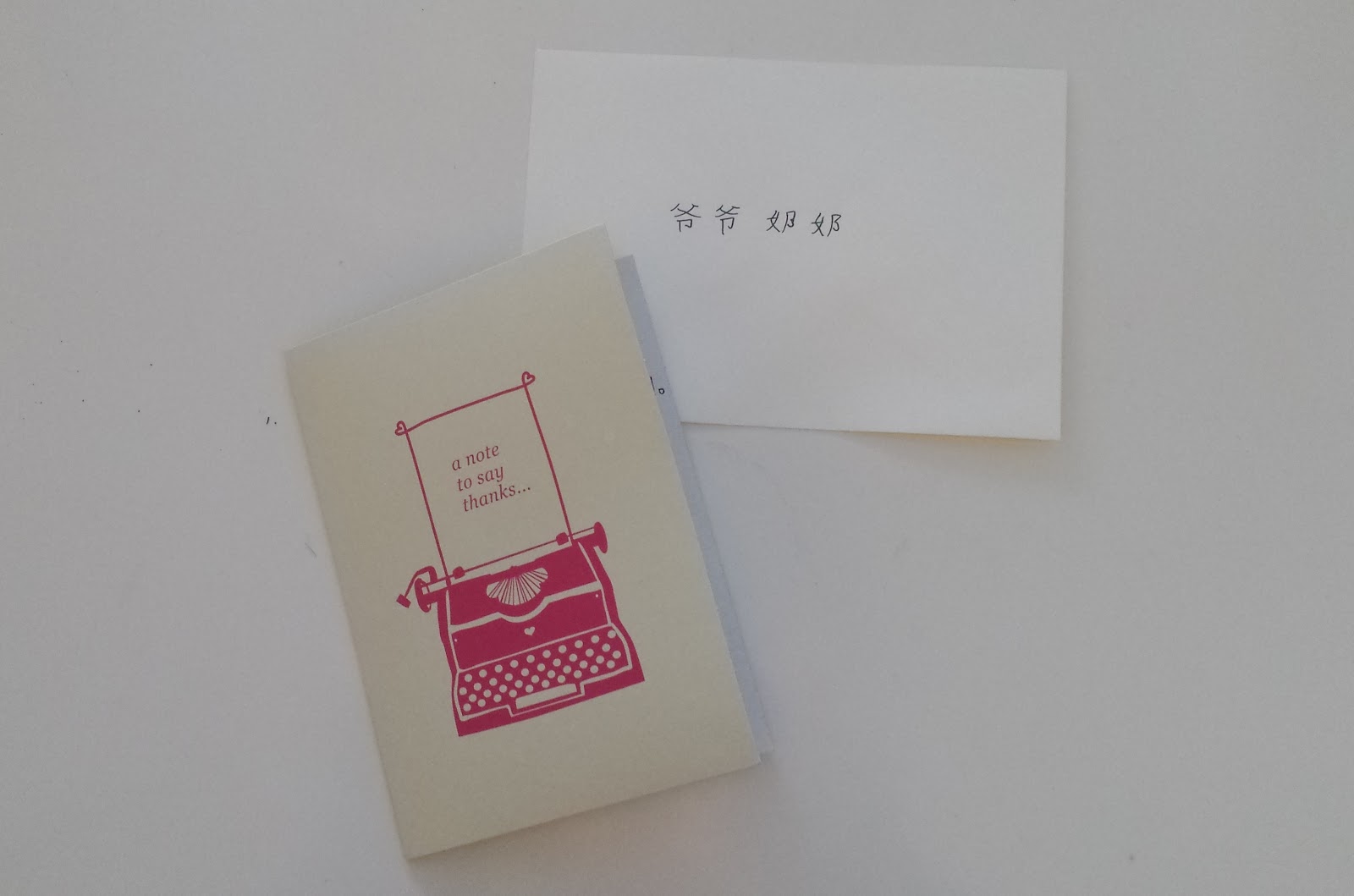This weekend has been fairly busy - I was away for most of it kicking butt at Deutschfest (wir gewannen!). But I am back and better before because this is the final update before my TEDtalk ~reflection.
 So this week, I decided to forgo writing sentences because I was working on my final product: a thank you card for my grandparents. Here is the card and envelope. It's a bit small, but the envelope says 爷爷奶奶 (yéyé nǎinai) - (paternal) grandfather and (paternal) grandmother. I mentioned in my first post, but the Chinese words for family members are very specific, so the words differentiate between paternal and maternal sides.
So this week, I decided to forgo writing sentences because I was working on my final product: a thank you card for my grandparents. Here is the card and envelope. It's a bit small, but the envelope says 爷爷奶奶 (yéyé nǎinai) - (paternal) grandfather and (paternal) grandmother. I mentioned in my first post, but the Chinese words for family members are very specific, so the words differentiate between paternal and maternal sides.Anyway, here's the translation:
So, after writing that translation, I realized how short that sounds. But while writing this, I was super stressed that I was going to mess up. I'm really happy with the final product - I think this is the neatest I've written any Chinese ever. Like ever. Some of it sounds really awkward because I'm not quite sure how to say exactly what I want...but I think I conveyed the right message. I'm nervous to show my grandparents, but I think they'll appreciate it :)Thank you both. I really like everything you do, like cooking and cleaning. When you leave, my father and I will miss you. I will call and write emails. I love you.
I said for my last post, I would tell you about the different dialects of Chinese, so here's the super quick condensed version:
- There are many, many dialects of Chinese
- "Dialects" isn't really an accurate term - many are not mutually intelligible and are more like independent languages by themselves
- Most dialects are classified into seven groups
- Within these groups, there are most likely smaller, regional dialects
- For example, my family speaks "Shanghainese", which isn't considered a major dialect, but it's very common in Shanghai
- If you're wondering, I can understand Shanghainese, but I can't really speak it
- Mandarin
- Spoken by ~71.5% of the pop
- Spoken in the north and southwest regions of China
- Wu
- Spoken by ~8.5% of the pop
- Spoken in the coastal area around Shanghai and Zhejiang
- Gan
- Spoken by ~2.4% of the pop
- Spoken around the Jiangxi province
- Xiang
- Spoken by ~4.8% of the pop
- Spoken around Hunan
- Hakka
- Spoken by ~3.7% of the pop
- Spoken in scattered areas from Sichuan to Taiwan
- Yue
- Spoken by ~5.0% of the pop
- Spoken around Guangdong and Guangxi, as well as Hong Kong & Taiwan
- Also known as Cantonese
- Min
- Spoken by ~4.1% of the pop
- Spoken in Fujian and coastal regions in the south
- Source
- Jess

虽然我不跟你同班,我想问你一个小问题:在你的TED讲中,你会不会说一点儿中文呢?(Though I'm not in your class, are you going to speak some Chinese in your TED Talk?)
ReplyDelete一点点:外国人和回国。 别的都是英文。 你的中文跟好呀!
DeleteI would write a comment in Chinese, but as I am currently using my school laptop, I will instead write a comment in a language comprehensible to all viewers. As far as I can see, there are few errors (other than a few around the "shao cai he da sao jia li" part). Clearly, you've come a long way, and I love the fact that you are using your Chinese skills to communicate with your grandparents through a letter!
ReplyDeleteThanks! I hope to continue after they return to China. Typing is much easier than actually writing because I get to rely on pinyin :)
Delete